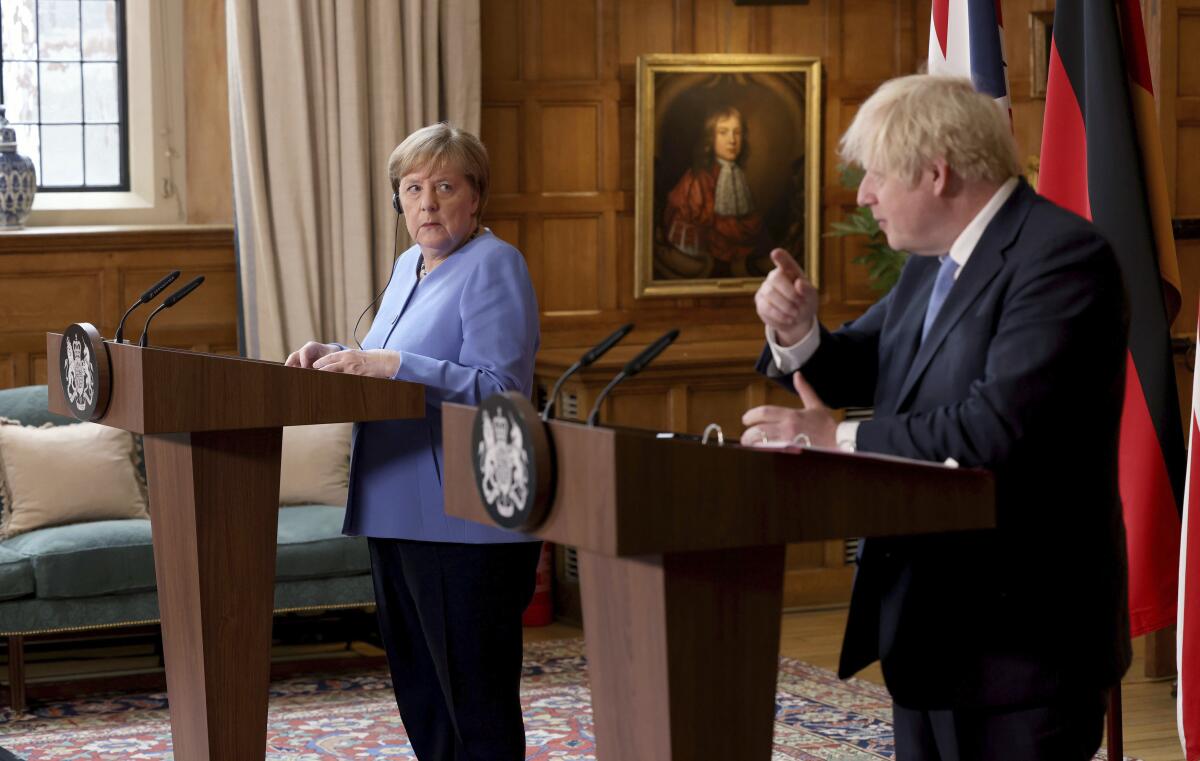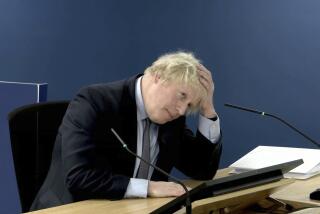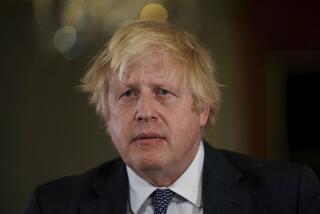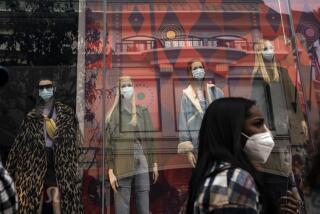Britain as ‘petri dish’? Plan to scrap COVID-19 restrictions stirs fears

British Prime Minister Boris Johnson’s backers have enthusiastically dubbed it “Freedom Day” — July 19, when the government is expected to lift nearly all coronavirus-related restrictions in England. But not everyone is celebrating.
Britain has had one of the world’s most successful vaccine rollouts, with nearly two-thirds of the adult population now fully vaccinated against COVID-19. The country, however, is confronting a huge wave of new cases, largely powered by the highly transmissible Delta variant.
On Tuesday, Johnson’s health minister, Sajid Javid, told the BBC that the country’s daily new caseload could nearly quadruple over the summer, potentially reaching a staggering 100,000 per day. That’s more than at the pandemic’s height.
New daily case lows in Britain this year briefly touched about 2,000, and currently run from 25,000 to 30,000 a day.
Johnson and his senior aides express confidence that the surge in cases won’t bring about a commensurate jump in hospitalizations and deaths, because of the protection against serious illness afforded by vaccines. So far, that prediction has been borne out.
But advocates for clinically vulnerable groups such as immunocompromised people are horrified at the prospect of restrictions being loosened just as new dangers loom.
“July 19 won’t be freedom day for some people,” the nonprofit group Blood Cancer U.K. wrote on Twitter. The head of the opposition Labor Party, Keir Starmer, called Johnson’s plan “reckless.”
The expected lifting of most restrictions comes at a moment when Britain’s overall COVID-19 resistance is being tested by the Delta variant, first identified in India, which in recent weeks has ravaged a number of countries with low vaccination rates. Because the opposite is true in Britain, scientists say the country is a unique test case.
“We have the biggest Delta outbreak in a well-vaccinated country,” Mark Woolhouse, a professor of epidemiology at the University of Edinburgh, told the Guardian newspaper. “We are a petri dish for the world.”
Here is some background on the potential risks and gains in Johnson’s latest COVID-19 gambit.
Why now?
The planned July 19 lifting of most restrictions is being touted by Johnson as a milestone, but the prime minister, characteristically, has left himself some wriggle room. A more definitive government announcement is expected on Monday, a week before the new rules would take hold, after consultations among government ministers and scientific advisors.
Johnson has had a bumpy public performance in combating the virus. Although Britain’s vaccination program has been hailed, early stumbles — a slow start in developing a national strategy, the uneven imposition of confusing and contradictory restrictions — took a heavy toll. The 57-year-old prime minister himself had a near-fatal case of COVID-19 last year, and Britain’s death tally of 128,000 is the highest in western Europe.
But despite fears of a coronavirus resurgence, many Britons are weary of restrictions after enduring one of the world’s longest lockdowns. With his strong populist streak, Johnson is exquisitely sensitive to public opinion, and critics often accuse him of making policy based on political expediency rather than other considerations. So he is seen as likely to push ahead with the plan, even in the face of objections.
And having embraced Brexit, Britain’s departure from the European Union that took final effect this year, the prime minister is eager to avoid further coronavirus-caused damage as Britain absorbs Brexit’s economic hit.
What do the new rules say?
The planned easing of restrictions would represent a fourth and final phase in the government’s pandemic strategy. Under the plan, mask-wearing and social distancing will become a matter of personal discretion. People will no longer be advised to work from home. All businesses will be open, including a few still-restricted ones such as nightclubs. Attendance limits on events such as weddings will be ended, and venues including theaters and concert halls can operate at full capacity.
What restrictions will remain?
A few. Masks will still be recommended — though not legally required — on public transport and in other enclosed spaces. Railway and airline companies can require mask use for patrons, though with an uncertain enforcement mechanism. The country will maintain a testing and tracing system, and those who test positive, or are found to have been in close contact with someone else who did, will need to self-isolate for two weeks. At international airports, there will be guidance — but not a rule — urging social distance of a little over three feet.
The government plan also puts the onus on the medically vulnerable to take measures to protect themselves — suggesting, for instance, that they avoid crowded public places and try not to travel on public transport at peak hours.
Are the new rules U.K.-wide?
No. They will apply only in England. Scotland, Wales and Northern Ireland are allowed to set their own health protocols. The overall thrust of coronavirus restrictions, however, has been fairly consistent across Britain.
Does this amount to a declaration by Johnson that the coronavirus crisis has ended in Britain?
It does not. The prime minister acknowledged Monday that the caseload could reach 50,000 new infections a day within the two weeks remaining before the new rules took effect.
Britain will try to counter the Delta surge by speeding up its vaccination program, cutting the waiting time between first and second shots from 12 weeks to eight. But Johnson also struck a fatalistic tone, suggesting that although relaxing the rules would help Britain move on, the virus was by no means eradicated.
“I want to stress from the outset that this pandemic is far from over,” he said. “We must reconcile ourselves, sadly, to more deaths.”
More to Read
Sign up for Essential California
The most important California stories and recommendations in your inbox every morning.
You may occasionally receive promotional content from the Los Angeles Times.










